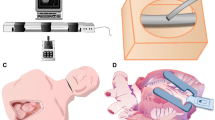Abstract
Objective
It is unclear whether novice trainees can be taught safely to perform adult cardiac surgery without any impact on early or late outcomes.
Methods
All patients (n = 1305) data were obtained from an externally validated, mandatory institutional database (2003–2010). ‘Novice’ is defined as a trainee who required substantial assistance or supervision to perform part or whole of the specified procedure (Intercollegiate Surgical Curriculum Programme UK, Competency Level ≤2). Outcome measures were in-hospital mortality, composite score of in-hospital mortality-morbidities, mid-term survival and revascularisation rate after CABG. Follow-up up to 7 years (median 3.2 years) was determined.
Results
Some 39 % (n = 510) of the cases involved novice (28 %-part, 11 %-whole procedure), 12 % (n = 157) competent trainees and 49 % (n = 638) consultant. Median EuroSCORE was higher in consultant group (p < 0.001). Without risk adjustment, composite outcome score and mid-term mortality were higher in consultant group (p = 0.03). With adjustment using EuroSCORE and propensity scores, EuroSCORE was significantly predictive of in-hospital mortality [odd ratio (OR) 1.38, 95 %CI 1.20–1.57, p < 0.001], composite outcome (OR 1.26, 95 %CI 1.15–1.37, p < 0.001) and mid-term mortality (HR 1.24, 95 %CI 1.18–1.31, p < 0.001) but not the operator categories. Further analysis of subcohort undergoing first-time, isolated CABG (n = 1070) showed that EuroSCORE remained predictive of adjusted in-hospital mortality (OR 1.39, 95 %CI 1.13–1.71, p = 0.002), composite outcome (OR 1.33, 95 %CI 1.19–1.49, p < 0.001) and mid-term mortality (HR 1.22, 95 %CI 1.10–1.35, p < 0.001). The operator categories were not associated with adjusted outcome measures including revascularisation rate after CABG.
Conclusion
Supervised training in adult cardiac surgery can be achieved safely at the early learning curve phase without compromising both early and mid-term clinical outcomes.
Similar content being viewed by others
References
Kron IL. Surgical mentorship. J Thorac Cardiovasc Surg. 2011;142(3):489–92.
Alexiou C, Doukas G, Oc M, Oc B, Hadjinikolaou L, Spyt TJ. Effect of training in mitral valve repair surgery on the early and late outcome. Ann Thorac Surg. 2005;80(1):183–8.
Asimakopoulos G, Karagounis AP, Valencia O, Rose D, Niranjan G, Chandrasekaran V. How safe is it to train residents to perform off-pump coronary artery bypass surgery? Ann Thorac Surg. 2006;81(2):568–72.
Caputo M, Chamberlain MH, Ozalp F, Underwood MJ, Ciulli F, Angelini GD. Off-pump coronary operations can be safely taught to cardiothoracic trainees. Ann Thorac Surg. 2001;71(4):1215–9.
Haan CK, Milford-Beland S, O’Brien S, Mark D, Dullum M, Ferguson TB, et al. Impact of residency status on perfusion times and outcomes for coronary artery bypass graft surgery. Ann Thorac Surg. 2007;83(6):2103–10.
Jenkins DP, Valencia O, Smith EE. Risk stratification for training in cardiac surgery. Thorac Cardiovasc Surg. 2001;49(2):75–7.
Oo AY, Grayson AD, Rashid A. Effect of training on outcomes following coronary artery bypass graft surgery. Eur J Cardiothorac Surg. 2004;25(4):591–6.
Goodwin AT, Birdi I, Ramesh TP, Taylor GJ, Nashef SA, Dunning JJ, et al. Effect of surgical training on outcome and hospital costs in coronary surgery. Heart. 2001;85(4):454–7.
Yap CH, Andrianopoulos N, Dinh TD, Billah B, Rosalion A, Smith JA, et al. Short- and midterm outcomes of coronary artery bypass surgery performed by surgeons in training. J Thorac Cardiovasc Surg. 2009;137(5):1088–92.
Stoica SC, Kalavrouziotis D, Martin BJ, Buth KJ, Hirsch GM, Sullivan JA, et al. Long-term results of heart operations performed by surgeons-in-training. Circulation. 2008;118(14 Suppl):S1–6.
Cohen MS, Jacobs JP, Quintessenza JA, Chai PJ, Lindberg HL, Dickey J, et al. Mentorship, learning curves, and balance. Cardiol Young. 2007;17(Suppl 2):164–74.
Hasan A, Pozzi M, Hamilton JR. New surgical procedures: can we minimise the learning curve? BMJ. 2000;320(7228):171–3.
Shuhaiber JH, Goldsmith K, Nashef SA. Impact of cardiothoracic resident turnover on mortality after cardiac surgery: a dynamic human factor. Ann Thorac Surg. 2008;86(1):123–30.
D’Agostino RB Jr. Propensity scores in cardiovascular research. Circulation. 2007;115(17):2340–3.
Wu AH, Aaronson KD, Bolling SF, Pagani FD, Welch K, Koelling TM. Impact of mitral valve annuloplasty on mortality risk in patients with mitral regurgitation and left ventricular systolic dysfunction. J Am Coll Cardiol. 2005;45(3):381–7.
Wright T. Factors affecting the cost of airplanes. J Aeronaut Sci. 1936;3(4):122–8.
Beard J, Rowley D, Bussey M, Pitts D. Workplace-based assessment: assessing technical skill throughout the continuum of surgical training. ANZ J Surg. 2009;79(3):148–53.
Beard JD. Assessment of surgical skills of trainees in the UK. Ann R Coll Surg Engl. 2008;90(4):282–5.
Marriott J, Purdie H, Crossley J, Beard JD. Evaluation of procedure-based assessment for assessing trainees’ skills in the operating theatre. Br J Surg. 2011;98(3):450–7.
Khan OA, Iyengar S, Pontefract DE, Rogers V, Ohri SK, Livesey SA. Impact of surgeon-specific data reporting on surgical training. Ann R Coll Surg Engl. 2007;89(8):796–8.
Maddaus MA. Would I do it again? Evolution to a new training paradigm. J Thorac Cardiovasc Surg. 2010;140(1):8–9.
de Leval MR, Carthey J, Wright DJ, Farewell VT, Reason JT. Human factors and cardiac surgery: a multicenter study. J Thorac Cardiovasc Surg. 2000;119(4 Pt 1):661–72.
Acknowledgments
Dr David Young Ph.D. from Department of Statistics and Modelling Science, University of Strathclyde, Glasgow reviewed the statistical method and results in this study. Richard Gadd, Amir Tahvili and Louisa Yates provided assistance in retrieving data.
Conflict of interest
None declared.
Author information
Authors and Affiliations
Corresponding author
Rights and permissions
About this article
Cite this article
Peng, E., Sarkar, P.K. Training the novice to become cardiac surgeon: does the “early learning curve” training compromise surgical outcomes?. Gen Thorac Cardiovasc Surg 62, 149–156 (2014). https://doi.org/10.1007/s11748-013-0321-6
Received:
Accepted:
Published:
Issue Date:
DOI: https://doi.org/10.1007/s11748-013-0321-6




